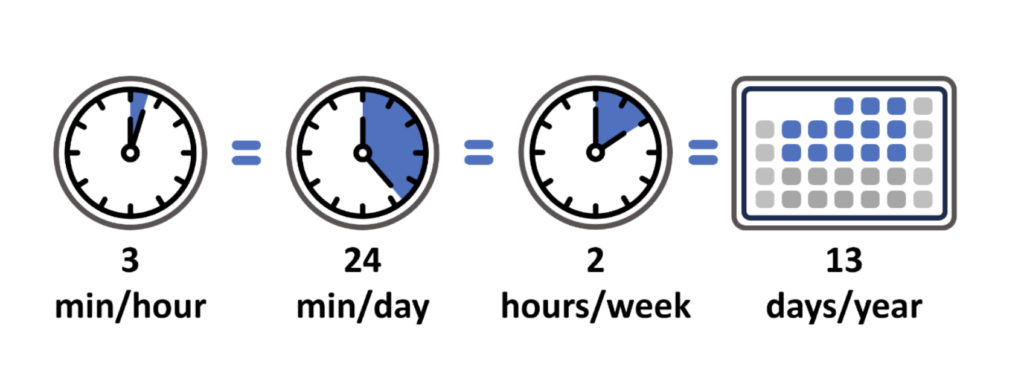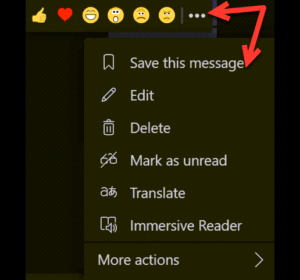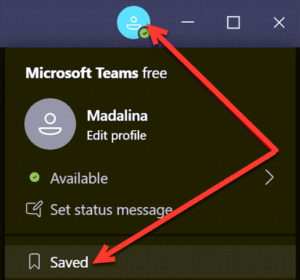

Close

6 minute read
Many of the clients I work with in the life sciences industry joined to make a positive impact on patient lives and speed up the drug development process – a cause near and dear to them. While that passion and pursuit still exists, they often feel like more of their day is spent just trying to keep up with an inbox that refills faster than they can respond, calendars so packed that they have no time for thinking, reflecting, or doing, and exist in a constant survival mode state. They are breaking. Their teams and colleagues are breaking. They know this isn’t sustainable but don’t know how to escape the cycle.
Some teams I have worked with have tried to reclaim their time (and inbox) with a complete overhaul. They were all in for a few days or a few weeks only to slip back to their prior habits. It was just too complicated and too much change all at once. They often need a simpler approach to…simplifying!
Sustaining success in reclaiming your time is about that first step. Making just one change and mastering it before moving on.
I’ve found that sustained success in reclaiming your time is about that first step. Making just one change and mastering it before moving on. Once that sticks, you make another, and another. You strive to be 1% better each day in a way feels right to you and sticks. 1% better each day is better than no change at all. Each change reduces a small inefficiency and makes way for the value-added work you want to be doing and love. Those small changes add up big time!

When you feel more in control of your day, you’re happier. Plain and simple. Your capacity to support others in more meaningful ways goes up. You can show up with a smile and mean it. Taking control of your time not only benefits you, but those around you. The benefits of choosing good productivity habits are contagious!
IDC data shows that “the knowledge worker spends about 2.5 hours per day, or roughly 30% of the workday, searching for information….60% [of company executives] felt that time constraints and lack of understanding of how to find information were preventing their employees from finding the information they needed.” Source: Information: The Lifeblood of the Enterprise.
When you can’t find what you need, when you need it, you lose more than time. You lose patience. You lose energy. You feel frustrated, depleted, and defeated.
Two places I see the most frustration are email overload and technology overwhelms, or “technostress”. The most often go to solution when things feel disorganized is introduction of a new technology. But often that just compounds the problem. It ends up collecting virtual dust.
We have been surrounded by the same technology for years with training and education available in client organizations in advanced features, but most don’t have a foundation of the basics to build on, so none of it gets used. So many feel shame in acknowledging they don’t know the basics so they don’t speak up – assuming everyone else does know. But when they do speak up, they find most others don’t know either! I partner with clients to make the most of the tools they already have and start with the basics. Every time we meet, we solve for a single pain point, even if small, to make work a little less frustrating. Keep reading for a game changer tip to reduce downtime finding what you need in Teams.
But first, here are a few foundational strategies I have used to help leaders reclaim their time for the long run.
How do you know if you’re doing the right work at the right time? Setting clear priorities is the first step in time management and productivity strategy to ensure you’re getting the right work done. With clearly defined priorities, you can more effectively triage your inbox, calendar, and to-do list.
Write your priorities down and have them visible at all times. If a “to do”, meeting, or request doesn’t align with your priorities, don’t be afraid to say “no”, “not right now”, or to delegate. Now that you know what work needs to be done, do you have a way to keep track of that work and when it’s due (and your brain doesn’t count)? Most people don’t have all their tasks consolidated and maintained in a single place. One of the key contributors to overwhelm is trying to keep all or some of your to do’s in your head. You spend more energy than you realize just trying not to forget all you have to do. You never feel truly relaxed or focused as your mind races. When I partner with clients we find a method that works for them for keeping up with tasks so their mind feels free and clear to focus on the more meaningful work at hand.
Once you’ve mastered task management, look for ways to streamline processes or repetitive tasks and reduce small amounts of time waste throughout the day. Creating effective and replicable frameworks (e.g. templates, go to PPTs) and standard file saving structures is a helpful early step. No need to reinvent the wheel (or that PowerPoint presentation)! Think of it as creating your own ‘toolkit’ to reduce downtime.
Close your eyes. Where do you store your forks? (Come on – play along and do it!) I bet you could immediately picture the exact location in your kitchen. You store your forks in the same place, day after day, for a reason. Why? So you can find one when you need it. There is no need for creativity in fork storage. Apply the same conceptual habits to your work. Spend our energy on areas that deserve it. Streamline the rest.
Think of task management as finding a recipe and gathering your ingredients so you’re planned and prepared for what you want to make and your own toolkit as the utensils, pots, and pans to cook up some value-added work.
As promised, and in the spirit of game changer back to basics, here is a tip that you can start using today to solve one of the most common pain points I hear from leaders, “I can’t find anything in Teams!”.
If someone sends you a chat, file, post, or message in Teams that you want to save for later, follow these steps to bookmark it for easy future access:



Christina Levine is a Partner and operations management consultant with 15+ years of experience in Program and Project Management, Operational Strategic Solutions, Communication, and Change Management. Teams love her sustainable solutions for better ways of working that unlock time for strategy, relationships, and growth.
If you would like to learn more write to Christina Levine at
christina.levine@scimitar.com or contact her on
.





